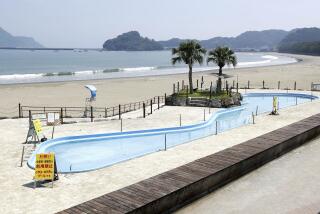Japan’s nuclear crisis unlikely to lead to another Chernobyl, U.N. expert says
- Share via
Japan’s earthquake-stricken nuclear facilities are unlikely to suffer the kind of catastrophic accident that occurred in Chernobyl 25 years ago, the Japanese director-general of the U.N.’s nuclear agency said Monday.
The design and structure of Japanese nuclear power plants are different from the Soviet-era facility where an April 26, 1986, explosion blew the roof off the northern Ukrainian complex’s No. 4 reactor, unleashing a radiation cloud that swept across Europe and around the world.
International Atomic Energy Agency Director-General Yukiya Amano told journalists in Vienna, where the U.N. agency has its headquarters, that it was “unlikely” that the situation at three reactors of the Fukushima Daiichi nuclear power complex would escalate into a Chernobyl scenario.
Photos: Scenes of earthquake destruction
The agency also said on its website that Japanese authorities have reported “decreasing coolant levels” in the reactor core of the No. 2 reactor and that plant operators have begun injecting seawater to maintain cooling of the reactor core.
“Seawater injections into Units 1 and 3 were interrupted yesterday due to a low-level in a seawater reservoir, but seawater injections have now been restored at both units,” the agency reported after the disruptions that occurred Monday morning local time in Japan.
Japan’s Nuclear and Industrial Safety Agency has reported that about 185,000 residents were evacuated from the residential areas around the plants as a precautionary measure.
The IAEA said it had sent 230,000 units of stable iodine to evacuation centers as an additional precaution. Iodine can be used to help protect against thyroid cancer should those in the vicinity of the nuclear complex suffer radiation exposure.
More to Read
Sign up for Essential California
The most important California stories and recommendations in your inbox every morning.
You may occasionally receive promotional content from the Los Angeles Times.











